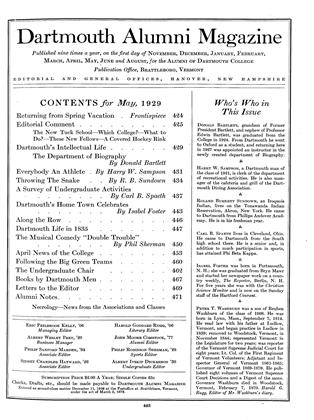President Hopkins has announced that beginning with the next academic year 1929-30, Senior Fellowships would be established at Dartmouth College. This plan has been endorsed by the Faculty Committee on Educational Policy and was authorized at the meeting of the Trustees April 1 and 2.
It will offer to a specially selected group of men in the Junior Class to the number of five —more or less—the privilege of graduation from Dartmouth College after their Senior year in residence and working according to their own devices. There will be no required attendance at classes, no examinations, no tuition charges, and no rules or regulations excepting such general ones as are incidental to being a member of the College in good standing.
The vote of the Trustees follows: "Resolved: In order that added stimulus may be given to the genuine spirit of scholarly attainment in undergraduate life and that the cultural motives of the liberal arts college may be emphasized; and in order that the tendencies of the honors courses toward freedom from routine requirements may be carried to further development in the cases of men outstandingly competent to utilize such freedom; and further that illustration may be given in the undergraduate body that the acquisition of learning is made possible largely by individual search and in but minor degree by institutional coercion; therefore be it
"Voted: 1. That there be hereby established the Senior Fellowships of Dartmouth College.
"2. That there shall be elected by the Trustees annually in June of each year members of the Junior Class of that year to the number of five—more or less—to be Senior Fellows of Dartmouth College during the following year.
"3. That election to the Senior Fellowships shall be made on nomination of the President, after conference by him with members of the faculty and particularly with a committee consisting of the Dean of the College, the Chairman of the Committee on Educational Policy, the Director of Personnel Research, the Dean of Freshmen, and the Junior Class Officer.
"4. That a Senior Fellow, after his election, must be in residence at Dartmouth College during the academic year following his election and must throughout the year be in good standing as a member of the College. During the tenure of his Fellowship, the Pellow shall be given complete freedom to pursue the intellectual life at Dartmouth College in whatever manner and direction he himself may choose. He shall not be required to attend classes, though he shall have the privilege of attending any; he shall not be required to take any examinations; and he shall not be required to pay any tuition fees to the College. At the end of the year of his Fellowship, the Fellow shall be given his degree in course.
"5. That this authorization shall become operative and go into effect immediately upon its passage and that announcement of the Senior Fellowships of Dartmouth College and the conditions of their award and tenure shall be made in all future catalogues of the College."
In announcing the adoption of this plan, President Hopkins called particular attention to the fact that this action at Dartmouth was based upon earlier action by the Board of Visitors and Governors at St. John's College, Annapolis, and that the plan as outlined for Dartmouth followed in principle and detail the fellowship system earlier inaugurated at St. John's College.
Of the Senior Fellowships of St. John's College, the distinguished scientist, Dr. Raymond Pearl of Johns Hopkins University, himself a graduate of Dartmouth College in the Class of 1899, and a Trustee at St. John's, has written:
"There is much to be said for the intrinsic virtues of freedom as a developer of intellectual powers. The prize fellowships of Trinity College, Cambridge, have a comprehensive intellectual and personal freedom as perhaps their chief element. Does any one question that this element has been of prime importance in producing the extraordinary record that the Trinity prize fellowship plan has achieved? If he does I suggest that he talk with any of the distinguished British men of science who have held these fellowships in the past.
"The senior fellowships simply push the Trinity plan back one year into undergraduate life. It seems likely, though it is a point which must be determined by experience, that the effect of the senior fellowships will not be confined to their holders. They will serve as a constant reminder to every undergraduate and every member of the faculty that the College regards the free and untrammeled pursuit of the intellectual life as the highest good, an ideal which has somehow been mislaid or forgotten in many American institutions of learning. They will also suggest to the undergraduate that the College is ready and willing to regard him as a responsible human being and not as a child. Finally to the student of outstanding ability they hold out the prospect of recognition, encouragement and reward of almost inestimable value, which may, and probably will, profoundly influence the course of his whole life."
 View Full Issue
View Full Issue
More From This Issue
-
 Article
ArticleA Survey of Undergraduate Activities
May 1929 By Carl B. Spaeth -
 Class Notes
Class NotesClass of 1898
May 1929 By H. Phillip Patey -
 Lettter from the Editor
Lettter from the EditorFor opinions which appear in these columns the Editors alone are responsible
May 1929 -
 Class Notes
Class NotesClass of 1923
May 1929 By Truman T. Metzel -
 Article
ArticleDartmouth Life in 1835
May 1929 -
 Class Notes
Class NotesClass of 1910
May 1929 By Arthur P. Allen
Article
-
 Article
Article100 Best Books Curriculum at St. John's College
October 1938 -
 Article
ArticlePresident's Valedictory
July 1948 -
 Article
ArticleNear-Perfect Efficiency
FEBRUARY 1972 -
 Article
ArticleHospital move given conditional approval
September 1986 -
 Article
ArticleThe Fraternity "Problem"
JANUARY, 1928 By "F. Clark S. '30." -
 Article
ArticleYour Brother's Keeper
June 1942 By WILLIAM W. GRANT '03


